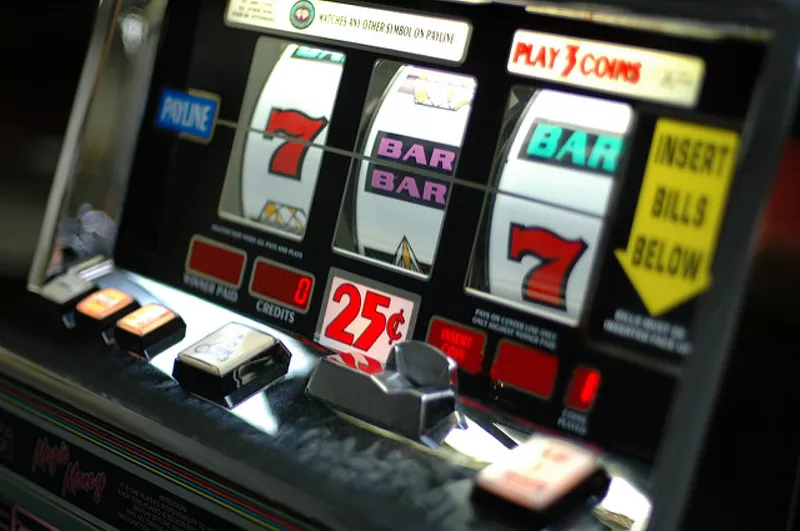
Image via Flickr/Jeff Kubina
As far as casino heists goes, the one targeting a string of St. Louis casinos in 2014 lacked a certain pizzazz. There were no guards to incapacitate, no vaults to crack and no escapes to be made with exotic European sports cars. Instead, four Russian men simply played the slots in local casinos in St. Louis and the Metro East, as well as casinos in Kansas City and in Temecula, California. What made things a bit more intriguing is that when the Russians played, they won, over and over again.
When the FBI announced indictments against the four men in December that year, the details of their scam were left hazy. The FBI press release noted that the men had "engaged in a conspiracy to cheat at least ten casinos in Missouri, California, and Illinois through the use of electronic devices," and that the devices were used to crack a certain model of slot machine called the Aristocrat Mark VI. Apparently, the devices communicated with a foreign server, and somehow that provided the men with the ability to consistently "predict the behavior" of the slots.
But how do you beat slots with a foreign server? What does "beating slots" even mean? Were these men working alone, or was this part of something bigger? The FBI wasn't talking. A federal judge sealed the four defendants' indictments. And so the questions were left unanswered.
At least, until now. According to a report published last week by Wired contributing editor Brendan Koerner, the 2014 indictments represented the first-ever bust of a global cheating scheme. And the critical evidence behind the arrests came from St. Louis.
In June 2014, according to Koerner, the Lumiere Place Casino noted that several Aristocrat Mark VI slot machines were distributing far more money than expected. Casino security started checking surveillance tape from the days associated with higher-than-usual payouts. U.S. Attorney Richard Callahan tells Riverfront Times that it was actually a Missouri State Highway Patrol corporal working for the state's Gaming Commission who discovered the payout discrepancies and subsequently alerted the casinos.
In any case, the surveillance tape showed a man playing some slots "while furtively holding his iPhone close to the screen," Koerner writes:
He’d walk away after a few minutes, then return a bit later to give the game a second chance. That’s when he’d get lucky. The man would parlay a $20 to $60 investment into as much as $1,300 before cashing out and moving on to another machine, where he’d start the cycle anew. Over the course of two days, his winnings tallied just over $21,000.
The only odd thing about his behavior during his streaks was the way he’d hover his finger above the Spin button for long stretches before finally jabbing it in haste; typical slots players don’t pause between spins like that.
After collecting without incident in June, the man in the video would return to St. Louis that December with his three cohorts. That would prove to be a dire mistake. The four men were spotted by security at the Hollywood Casino and arrested.
Three of the suspects eventually pleaded guilty and received two year-sentences in federal prison. (A fourth, Yevgeniy Nazarov, had his case dismissed for lack of evidence that he'd physically participated in the scam, says Callahan. The Wired story claims Nazarov avoided conviction by cooperating with authorities.)
In his story for Wired, Koerner cites a Las Vegas–based casino security consultant who had been apparently tracking these particular scammers for years.
The key to the scheme involved an older but widely used slot machine, the Aristocrat Mark VI, and figuring out how to break its pseudo-random number generators. All the hackers needed was access to their own Mark VI — and procuring a slot machine wasn't a problem in Russia in the late 2000s. That's because Russia outlawed gambling in 2009, a move that forced thousands of casinos to unload their unusable slot machines to any available buyer, and at penny-slot prices.
After getting their hands on the Mark VI and its source code, a Russian criminal organization based St. Petersburg cracked the pseudo-random number generator. That "pseudo" is the important part — it means that the randomness of the slots isn't really all that random. From the Wired story:
PRNGs take an initial number, known as a seed, and then mash it together with various hidden and shifting inputs — the time from a machine’s internal clock, for example — in order to produce a result that appears impossible to forecast. But if hackers can identify the various ingredients in that mathematical stew, they can potentially predict a PRNG’s output.
That explains what Lumiere's surveillance tapes captured in June 2014. The man holding an iPhone "furtively close to the screen" was actually transmitting information to a team of hackers.
Here's how it worked: The operative would record two-dozen spins on the targeted slot machine and upload the footage to analysts in St. Petersburg. The St. Petersburg team, in turn, would use that footage to calculate the slot's pattern, because they'd already cracked this particular model’s pseudo-random number generator. A few minutes later, the St. Petersburg team would send a list of "timing markers" to an app on the operative's phone, causing the phone to vibrate roughly .25 seconds before he needed to slap the spin button. All the operative would have to do is wait for the buzz, hit the button and get paid.
The Wired story doesn't say how much money was stolen in total, but Callahan tells RFT that investigators estimate that one trip — hitting multiple casinos — could net them around $100,000. And that could mean a really big payday: Callahan says the Russian scam team made between fifteen and twenty trips before the 2014 arrests.
According to a redacted indictment, the Russians targeted the Casino Queen in East St. Louis and the Argosy, Ameristar, Hollywood, Lumiere and River City casinos in the St. Louis area. In Kansas City, the crooks hit the Ameristar, Harrah's and Isle of Capri casinos.
Despite the arrests, scammers are still using similar methods to break slot machines all over the world. According to the Wired article, the fact that authorities were able to snag the four men in St. Louis was an aberration.
For Callahan, this is just another chapter in the endless back-and-forth between criminals and law enforcement.
"Each day there’s new schemes, and I don’t think we’re ever going to see an end to scheming of all sorts," he says. "At the moment, we haven’t discovered any new groups engaging in this behavior, but it's something that we and the casinos are always on the lookout for."
Follow Danny Wicentowski on Twitter at @D_Towski. E-mail the author at [email protected]





